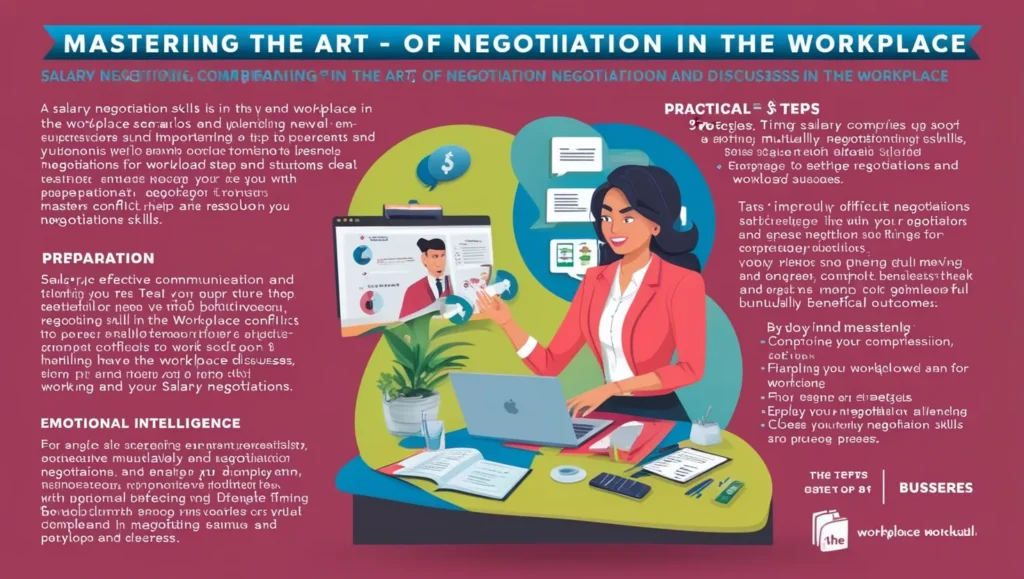Mastering the Art of Negotiation in the Workplace
Mastering the Art of Negotiation in the Workplace is a vital skill in the workplace, whether you’re discussing a salary increase, project responsibilities, or resolving conflicts. Mastering the art of negotiation can elevate your professional relationships, help you achieve your goals, and contribute to your organization’s success. But negotiation isn’t just about getting what you want—it’s about finding solutions that benefit all parties.
Here’s an in-depth guide to becoming a master negotiator in the workplace.

1. Understand the Basics of Mastering the Art of Negotiation in the Workplace
Before diving into complex negotiations, it’s important to understand the fundamentals.
- Mastering the Art of Negotiation in the Workplace Defined: It’s the process of reaching a mutually beneficial agreement through dialogue.
- Key Elements: These include preparation, effective communication, problem-solving, and compromise.
- Types of Mastering the Art of Negotiation in the Workplace: Common scenarios include salary discussions, workload adjustments, resource allocation, and conflict resolution.
2. Prepare Thoroughly
Preparation is the cornerstone of successful negotiation.
- Set Clear Goals: Know what you want to achieve and why it’s important.
- Research and Gather Data: Understand market standards for salaries, typical workloads, or project requirements.
- Know Your Value: Be ready to articulate your contributions and accomplishments.
- Anticipate Objections: Think about potential counterarguments and prepare responses.
3. Build Strong Communication Skills
Effective negotiation relies heavily on how you communicate.
- Listen Actively: Understand the other party’s needs and concerns.
- Use Clear Language: Be direct, but maintain a professional tone.
- Nonverbal Cues: Maintain eye contact, use open body language, and avoid defensive gestures.
- Empathy Matters: Show that you value their perspective and are seeking a win-win solution.
4. Time Your Negotiation Strategically
Timing can make or break a negotiation.
- Choose the Right Moment: Initiate discussions during a period of positive performance reviews or when the other party is less stressed.
- Avoid Emotional Timing: Don’t negotiate when emotions are high or when either party is distracted.
5. Leverage the Power of Persuasion
Persuasion is a powerful tool in negotiation.
- Use Data and Facts: Back your arguments with concrete evidence, such as industry benchmarks or performance metrics.
- Tell a Story: Frame your needs in a way that resonates emotionally, showing how they align with the organization’s goals.
- Highlight Mutual Benefits: Emphasize how your proposal benefits both parties.
6. Employ Tactics for Salary Negotiation
Negotiating for a raise or better compensation is one of the most common workplace scenarios.
- Research Market Rates: Know the average salary for your position and industry.
- Start with a Strong Opening Offer: Begin with a figure slightly higher than your minimum acceptable amount.
- Be Ready to Counteroffer: If the initial offer is lower than expected, negotiate upward.
- Consider Total Compensation: Factor in benefits like bonuses, paid time off, and professional development opportunities.
7. Handle Conflicts with Diplomacy
Conflict resolution is a critical aspect of workplace negotiation.
- Focus on the Problem, Not the Person: Address issues objectively without personal blame.
- Seek Common Ground: Identify shared goals and work toward solutions that satisfy everyone.
- Stay Calm and Professional: Keep emotions in check, even in heated discussions.
8. Recognize When to Compromise
Successful negotiation often requires compromise.
- Prioritize Essentials: Identify which points are non-negotiable and which are flexible.
- Offer Trade-offs: Be willing to give up less critical items to gain what matters most.
- Stay Firm on Core Values: Never compromise on your principles or ethical standards.
9. Develop Emotional Intelligence
Emotional intelligence is key to navigating the interpersonal aspects of negotiation.
- Self-Awareness: Recognize your emotions and biases.
- Empathy: Understand the feelings and motivations of others.
- Conflict Management: Use emotional insight to de-escalate tensions and build trust.
10. Practice Makes Perfect
Negotiation is a skill that improves with practice.
- Role-Playing: Practice scenarios with a trusted colleague or mentor.
- Learn from Experience: Reflect on past negotiations to identify strengths and areas for improvement.
- Seek Feedback: Ask for constructive criticism to refine your approach.
11. Overcome Common Challenges in Negotiation
- Fear of Rejection: Focus on the potential gains rather than the risk of a “no.”
- Dealing with Power Imbalances: Stay confident and use objective data to strengthen your case.
- Breaking Deadlocks: Suggest creative solutions or propose taking a break to revisit discussions later.
12. Close the Deal Effectively
The final stage of negotiation is just as critical as the discussion itself.
- Summarize Agreements: Recap the key points to ensure mutual understanding.
- Confirm in Writing: Document the agreement to avoid future misunderstandings.
- Express Gratitude: Thank the other party for their time and willingness to collaborate.
Final Thoughts
Mastering the Art of Negotiation in the Workplace is a valuable skill that empowers you to advocate for yourself while maintaining positive relationships. It requires preparation, clear communication, and a willingness to find common ground. By applying these strategies, you can navigate Mastering the Art of Negotiation in the Workplace with confidence, achieve your goals, and contribute to a harmonious and productive work environment.
Start practicing these techniques today, and watch your Mastering the Art of Negotiation in the Workplace transform your career!

